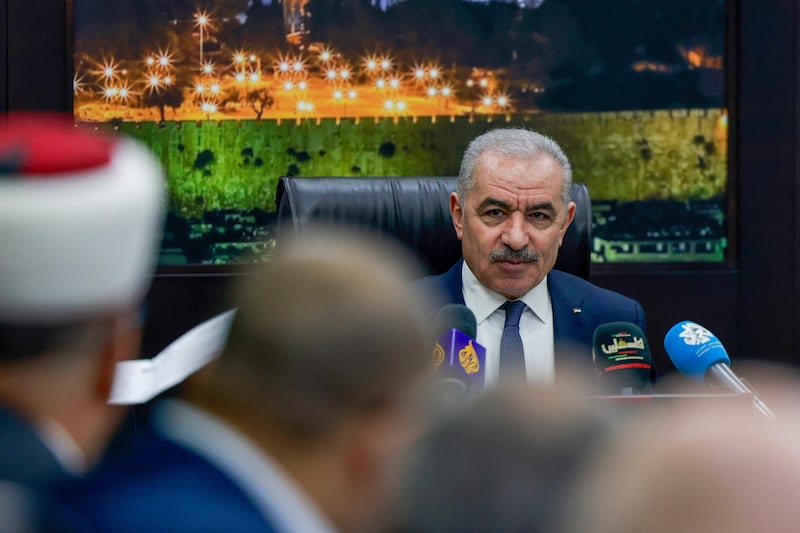Live updates: Follow the latest news on Israel-Gaza
Palestinian Prime Minister Mohammad Shtayyeh submitted his resignation to President Mahmoud Abbas on Monday, paving the way for a cabinet reshuffle that could open doors for reforms.
The new government is expected to be a technocratic one, with Mr Abbas still at the helm. Secretary General of the Palestinian Liberation Organisation Hussein Al Sheikh is also expected to remain part of the new government, Tahani Mustafa, senior analyst at the Crisis Group, told The National.
Ms Mustafa has been in touch with high-ranking Palestinian officials within the Palestinian Authority (PA) and ministries in the occupied West Bank.
There has been increasing pressure by the US on the PA to make reforms since the Israel war in Gaza began in October. In January, US Secretary of State Antony Blinken said the “day after” scenario for Gaza should include the creation of an independent Palestinian state government by a reformed PA.
Israeli officials have repeatedly said the future of Gaza would not include the militant group Hamas, while also undercutting the PA's ability to govern the strip.
"The goal of change is to present a new government that is internationally acceptable," a Palestinian official told The National.
"A government that enjoys some credibility and is capable of implementing many international requirements, including financial control and auditing, in addition to being technocrat."
The main candidate to lead the government is Mohammad Mustafa, "an expert with an international dimension and linked to the world of investment", another source said.
Born in 1954, Mr Mustafa has been a senior adviser to Mr Abbas on economic affairs since 2005. He has also served as deputy prime minister of the PA and minister for economy.
He has been chairman of the Palestine Investment Fund and is the founding chief executive of telecoms provider PalTel.

The source said the next stage may feature plans for reconstruction in Gaza, a new authority and the possibility of international recognition of the idea of a Palestinian state. Therefore, "what is required is an internationally accepted personality, capable of transcending the idea of Hamas being in power".
The US administration was hoping Mr Abbas – the ageing, unpopular leader of the PA – would agree to reform the government so that it can administer the occupied West Bank as well as the Gaza Strip after the conflict ends, as part of an effort towards the elusive two-state solution.
"The leadership of the Palestinian Authority is a question for the Palestinians themselves to decide," US State Department spokesman Matthew Miller said on Monday.
"We think those steps are positive, we think they're an important step to achieving a reunited Gaza and West Bank under the Palestinian Authority, so we will continue to encourage them to take those steps."
Mr Abbas, 88, known colloquially as Abu Mazen, has been President for 18 years and has shown little sign he is willing to step aside to allow for a new generation to lead.
Established in 1993 as part of the Oslo Accords, the PA, from its base in Ramallah, administers civilian affairs and co-ordinates with Israel on security.
Ms Tahani said the PA had been reluctant to back any day-after proposals for the first three months since the beginning of the war in Gaza on October 7 for fear of appearing to succumb to Israeli force.
But that has since changed, she said.
“Since mid-December, you’ve seen the PA put out statements that effectively say they would back anything that guarantees their survival.”
The new government will not include members of Hamas, Ms Mustafa said, and is in line with a US pan for the “day after” in Gaza.
“They’ve been talking about it in technocratic, securitised terms, which means you’re not going to have an election, or democratically reformed PA.”
During his speech at Monday's cabinet session, Mr Shtayyeh said that moving forward, the Palestinian government would need to take into account the “emerging reality in the Gaza Strip”.
The resignation is in light of the “political, security and economic developments” of the Israeli war in Gaza and “unprecedented escalation” in the West Bank, Mr Shtayyeh said.
The emphasis of the new government will also be mostly on security and logistics, Ms Tahani said, with plans in place to send “over 1,000 security personnel to Jordan for training”.







